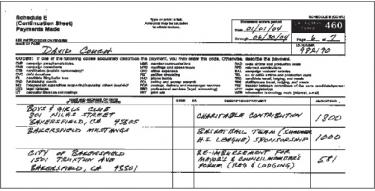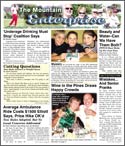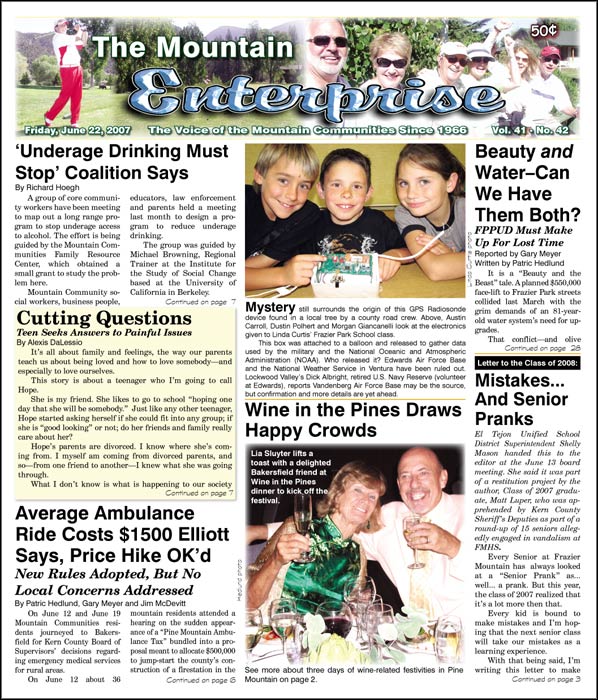
Form 460, the Campaign Disclosure Statement
In order to provide background for last week’s article, "What About Mil Potrero Park? And Who Is Mike Berg?" which mentioned this event, we reprint this story from July 15, 2005.
By Patric Hedlund
Filed under the category of "oops!" this week is the story of the digital bullet which was aimed at the reputation of Bakersfield City Councilman David Couch, but ricocheted back instead to impact the credibility of the president of the nascent Frazier Mountain Recreation Association (FMRA), Lloyd Wiens.
Couch, a financial services consultant and former vice mayor of Bakersfield, is President of the Board for the Boys & Girls Club of Bakersfield.
Wiens objected to a recent visit by Couch with Boys & Girls Club of Bakersfield’s Executive Director Zane Smith to the Family Resource Center in Frazier Park, where the duo gave an introductory presentation about Boys & Girls Club programs in Bakersfield and Lamont. They offered to assist in establishing such a program here. The Mountain Enterprise reported about the enthusiasm expressed at that meeting.
This spring Wiens established a contract with El Tejon Unified School District to use Frazier Mountain High School facilities for a recreation program, which this paper reported as promising. Then May and June organizational meetings for FMRA (announced to the public) were cancelled without notice or explanation. Until this week, Wiens said that the organization would still provide summer activities for youth, though schedules and details were still unavailable.
On July 2 this note was broadcast to an email listserv called Internet Outdoors Unl., which is owned by Lloyd Wiens:
FOLLOW THE MONEY!
Is it not intriguing that the Bakersfield Boys and Girls Club was one of the few contributors to David Couch’s campaign in the first six months of 2004 – in the amount of $1,800. If you were wondering why he is representing them, this is it. Is this not a nonprofit organization? Why are they making political contributions from contributions they receive from the public for their operations??? I suspect that the State Elections Commission would call this a direct conflict of interest by a public employee and by a nonprofit corporation – a serious violation.
Lloyd Wiens
No supporting evidence or attribution for this sensational allegation was provided. Nonetheless, Wiens’ charge of "a serious violation" by Couch winged its way to at least 35 recipients. At least four were newspaper reporters, including two correspondents for The Bakersfield Californian and two other publications, including The Mountain Enterprise. In the manner of internet publishing, it appears the note was then re-sent to an even wider lists of readers, perhaps by Wiens and his friends themselves.
On July 4, conspiracy charges followed:
Note: Harvey Hall, the ol’ mayor, and Couch, the Vice Mayor, are both on the Board. More conflicts. So Couch approved a donation of $1,800 in 2004 by the Club to himself and Mayor Hall condoned it.
lw
The charges blew into a high wind of internet babble over the following two weeks, growing into a condemnation of those on the mountain who might consider becoming involved with Couch and the Boys & Girls Club proposal. "This rumor campaign distracted focus at a critical moment from the business of setting up youth activities for this summer," said Linda MacKay, who works at the Family Resource Center and is President of the Mountain Communities Town Council.
A search of the Kern County website yields Form 460, the Campaign Disclosure Statement-a financial report required of those who raise political campaign funds. At the end of June 30, 2004, according to the report, Couch’s campaign fund (which was started when he ran for City Council several years ago) had received $80 in 2004 and had spent $5,856 for the year. Notably, an entry on Schedule E "Payments Made" reveals an $1,800 contribution from Couch to the Boys & Girls Club rather than the reverse. It appears that the allegations in Wiens’ published email reversed the facts: what was condemned as "a serious violation" was actually an act of generosity to benefit the Boys & Girls Club.
In a telephone interview Monday, July 11, Wiens at first insisted that in his opinion "it is unethical either way, whether [Couch] received a political donation from a nonprofit or made a donation from campaign funds, it is unethical."
He said he did not have at hand the legal citation to support his statement, but said: "it is a sleazy act." [California Government Code 89515 says that campaign funds may be used to benefit nonprofit organizations. –Ed.]
"None of this would have ever developed if people had got on the bandwagon and got behind what we [Frazier Mountain Recreation Association] are doing. I’m the only one who has put money on the line for the kids…it has cost me over $2,000…and this is what it has turned into…I’m finished with this."
Sounding suddenly tired, he said, "I made a mistake…did you ever make a mistake?" He did not offer to circulate a retraction or an apology: "other people can do that," he said. He said that he had been working for five years to develop FMRA.
Couch, a V.P. of investments with Smith Barney, confirmed Tuesday that he had donated excess campaign funds as well as personal funds to the Boys & Girls Club. He said this event would not shake his willingness to assist in developing a program here if it is desired.
"I’m sad that Lloyd sees this as an either/or situation," Linda MacKay said. "I want to see us work together with Lloyd to strengthen both programs….," adding: "I thought the Boys & Girls Club was targeted to a different population- to primarily serve younger children in an after-school program. Dave Couch said they would be happy to work with other programs like FMRA."
See related story "Has Email Defamation Become a New Mountain Sport? (Commentary)
| Has Email Defamation Become a New Mountain Sport? (Commentary) | ||||||||||||||||||
| [printer friendly] | ||||||||||||||||||
By Richard Hoegh Libelous emails circulating throughout the mountain region appear to be on the rise. Targeted recipients are people who are in prominent positions, civic leaders and elected officials. Is there a reason? Can broadcasting degrading falsehoods on the internet ever be justified? Can the resulting injuries be simply ignored? What impact does this practice have on our broader community? California law provides to every person a basic protection against defamation. Defamation can be defined as "a publication, oral or written, which can expose any person to hatred, contempt, ridicule or obloquy or which injures him in his occupation." If it is written, it is libel; if oral, it is slander. A false charge that someone has committed a crime is libelous on its face. In a court of law, there are defenses against charges of libel. A communication about a public official regarding "a matter of public concern" creates liability only if there is clear and convincing evidence that the communication or report was made with knowledge of its falsity or with reckless disregard for truth or falsity of the statement. Consider this example: An individual publishes false charges, saying that a public official has received an illegal political donation from a charity and misused his position on the board of directors of that charity for personal gain. Is there such a defense if public records reveal the exact opposite to be the truth-that in fact the sum in question was a donation from the official to the charity? Can the publisher’s claim not to know the charge is false stand as a defense? Beyond that, what impact does the charge have upon the donor, who now stands publicly accused of a crime? Case law holds that there is a duty on the part of those who publish to investigate the veracity of their statements prior to publication. Sending an email on the internet makes us all publishers. Email does not stay private, and in the current example, emails have been sent to long lists of individuals, community volunteers and public officials throughout the state. In addition, search engines such as Google may give an eternal life to false statements made about others. The original charge of wrongdoing, libelous as it is, remains on the internet- an archive of defamation. Someone else can easily come along, and republish the libelous material as true, perpetrating and multiplying the original injury. The courthouse does not provide a helpful remedy. What can we do here in our community to eliminate or curb the growing intensity of abuse on the internet? Richard Hoegh received his L.L.D. from Harvard Law School. Although he is retired from practice, he is a member in good standing with the California Bar Association. He serves as a community correspondent for The Mountain Enterprise. |
||||||||||||||||||
This is part of the June 22, 2007 online edition of The Mountain Enterprise.
Have an opinion on this matter? We'd like to hear from you.



